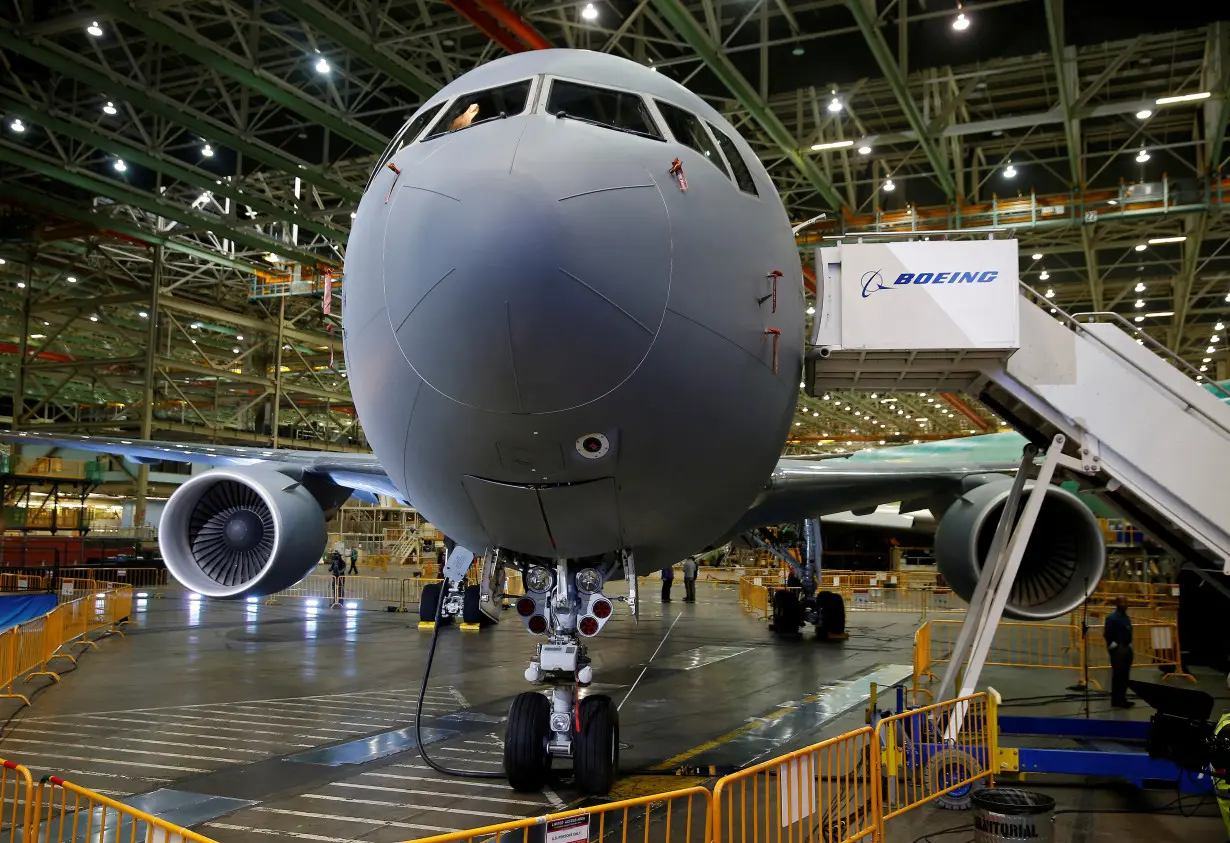By Valerie Insinna
WASHINGTON (Reuters) - Boeing's defense business is proving harder to turn around than executives initially predicted, with supplier errors and high manufacturing costs contributing to $1.7 billion in losses this year on programs like the next Air Force One and NASA's Starliner capsule.
Despite absorbing $4.4 billion in losses in 2022 – which executives said would lower the risk of future cost overruns – the unit has seen little improvement this year.
Excluding last year, losses on Boeing's defense programs in 2023 exceed those from all years since 2014, according to a Reuters review of Boeing’s regulatory filings.
Boeing is unique among its defense contractor peers, as companies like Lockheed Martin, General Dynamics and RTX are seeing higher revenues due to demand from the war in Ukraine.
Unlike those companies, however, Boeing is locked into handful of contracts that force the planemaker to take a loss when technology development goes over budget.
The defense unit's losses this year include $933 million in charges in the third quarter, mostly comprising a $482-million loss building two Air Force One planes and a $315-million charge on an unidentified satellite program that had not previously lost money.
Boeing's executives said they are putting in place new training and deploying resources to suppliers to ensure the unit moves from negative margins to high-single digit margins by 2025-2026, when its most troubled programs are slated to be past flight testing and on more stable footing.
“We're driving lean manufacturing, program management rigor and cost productivity consistently across the division,” Chief Financial Officer Brian West said during a Wednesday earnings call. Boeing declined to comment beyond executives' comments on the call.
Byron Callan, a defense analyst with Capital Alpha Partners, said Boeing's 2025-2026 timeline to get to positive margins is feasible but questioned why it took the company years to institute programs to improve execution.
"Someone really dropped the ball on all of this," he said.
Boeing shares have lost 6% this year, compared with the broad-market S&P 500's 9% gain.
FIXED PRICE CONTRACTS
Analysts also say there is little Boeing can do to offset the financial burden of its long list of fixed-price development contracts with customers like the U.S. Defense Department and NASA, which lock the planemaker into paying all costs above an agreed-upon threshold.
These deals, which make up 15% of Boeing's defense program revenue, were reached before Boeing's commercial airplanes business was decimated by the MAX crisis and before the pandemic and high inflation caused costs to spike for materials and labor. Other headaches include a recent manufacturing snafu where a supplier improperly coated KC-46 fuel tanks.
The losses suggest Boeing lacks a true understanding of costs as each new charge “is an upward revision to cost expectations, versus only three months prior,” said Seth Seifman of JP Morgan, in a Wednesday note to investors. “Even after excluding charges, BDS (Boeing Defense Space and Security) still did not generate a real profit.”
Boeing has been adamant it won't enter into new fixed-price contracts for the development stage of weapons because the unpredictability associated with designing and testing a new product often brings unforeseen costs.
However, the company's current fixed-price development efforts, which include the U.S. Air Force's KC-46 refueling tanker and T-7 training jet, new Air Force One planes, the Navy's MQ-25 tanker drone, and NASA's Starliner have all continued to run over budget this year.
The latest charge for Air Force One brought total losses to $2.4 billion on a $3.9 billion contract to develop two planes. The program’s current schedule calls for the first jet to be delivered by September 2027.
West also noted $136 million in additional losses taken during the quarter, including a $71-million charge for the MQ-25 program.
While KC-46 appears to be stabilizing and T-7 will eventually make a profit, there's “not much you can do” for costly, low-volume programs like Air Force One or MQ-25, said Richard Aboulafia of AeroDynamic Advisory.
A better bet, and one Boeing's defense segment is aggressively pursuing, is inking future contracts for next-generation fighter jets and cutting-edge drones.
“It's a target-rich environment,” Aboulafia said.
(Reporting by Valerie Insinna; Editing by Rod Nickel)

 TikTok seeks to reassure U.S. employees ahead of Jan. 19 ban deadline
TikTok seeks to reassure U.S. employees ahead of Jan. 19 ban deadline
 US won't seek charges in unarmed Black motorist Ronald Greene's fatal 2019 arrest
US won't seek charges in unarmed Black motorist Ronald Greene's fatal 2019 arrest
 Euro zone households could increase consumption, ECB chief economist says
Euro zone households could increase consumption, ECB chief economist says
 Foreigners sold South Korean equities last month by most since early 2020
Foreigners sold South Korean equities last month by most since early 2020
 Trump and Biden national and homeland security staff will meet Wednesday for threat exercises
Trump and Biden national and homeland security staff will meet Wednesday for threat exercises
 As fires ravage Los Angeles, Tiger Woods isn't sure what will happen with Riviera tournament
As fires ravage Los Angeles, Tiger Woods isn't sure what will happen with Riviera tournament
 Antetokounmpo gets 50th career triple-double as Bucks win 130-115 to end Kings' 7-game win streak
Antetokounmpo gets 50th career triple-double as Bucks win 130-115 to end Kings' 7-game win streak
 No 97 Laura Siegemund upsets Olympic champion Zheng Qinwen at the Australian Open
No 97 Laura Siegemund upsets Olympic champion Zheng Qinwen at the Australian Open








